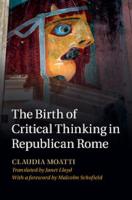
CUP (2015) h/b 386pp £75.00 (ISBN 9780521895781)
In his JRS (2000) review of La Raison de Rome: naissance de l’esprit critique à la fin de la République (1997), Malcolm Schofield welcomed the prospect of an English translation of this extensive and impressive study. Here his wish is realised (including a foreword by Schofield himself). This English edition differs only a little from the French original, including a short (8 page) additional introduction and Schofield’s foreword. The footnotes have also been expanded and reformatted.
The book has an ambitious aim: to offer a general account of the development of rational forms of thinking in Rome during the late Republican period. The backdrop of M.’s project is crisis—namely, political, but we must also note the impact of an increasing influx of wealth, people, knowledge, and ideas. Organisation, expansion, debate, definition, and Roman acculturation are key factors involved in M.’s undertaking. It is the crisis which M. portrays as the stimulation for rationalisation in its many forms. Her approach is an historical one, as she herself explains in an introduction especially written to open the English edition; her study is not just of the philosophical ‘ratio’ because ‘rationality’ means so many different things in different contexts. She is interested in what kind of rationality the Roman elite aspired to (p. 2). For M., the ultimate and greatest achievement of this critical thinking is the emergence of a reformed Roman identity. This identity is born from the contact with, curiosity about (chapter 2), and assimilative attitude to, ‘the other’ (chapter 6).
M. emphasises the centrality of the social usefulness of critical reason. She argues that the critique of tradition and inherited notions of authority in the intellectual works of Rome’s elite did not aim to dismantle preconceived and ubiquitous concepts, but to discuss them. When examining theology and rationality’s impact on religion, for example, M. maintains that Cicero (most specifically) is not attacking Roman religion ‘as an ensemble of practices and rites’ but rather the ‘mode of belief’, which he saw as passive (p. 181). A more critical and more involved theological discussion was required precisely in order to safeguard religion (p. 191-2). M. argues that this critique and birth of critical thinking, hatched from the Roman elite’s increasing contact with Greek methods of argument, was the impulse for the changes seen in religion during the late republic. Consequently, M. sees rationality as a way of securing the endurance of tradition by imposing reinterpretations to fit the dynamism of their changing world.
The thread of ‘reason’ is easy to follow through this meandering account of republican culture. M.’s ideas are complex and compact, often negotiating several authors (and figures) of various genres under one thematic heading (e.g. p. 157: thinking about freedom of thought in a subsection of chapter 3 entitled ‘Time and power: ‘the invention of tradition’’, M. considers Cicero, Varro, Pompey, Caesar, Antistius Labeo, Cremutius Cordus, Titus Labienus, Cassius Severus, and Tacitus in a single paragraph). However, this is where the strength of this study lies—in the connections it makes over such an array of material. It is dense, but the narrative style ensures its remarkable readability. A large part of M.’s argument rests on successfully weaving together general ideas about Rome with information and quotations from ancient authors. The translator has done well to preserve the elegance and weaving style of M.’s French prose. Anyone interested in the late Republican period should read this book.
Lauren Emslie
